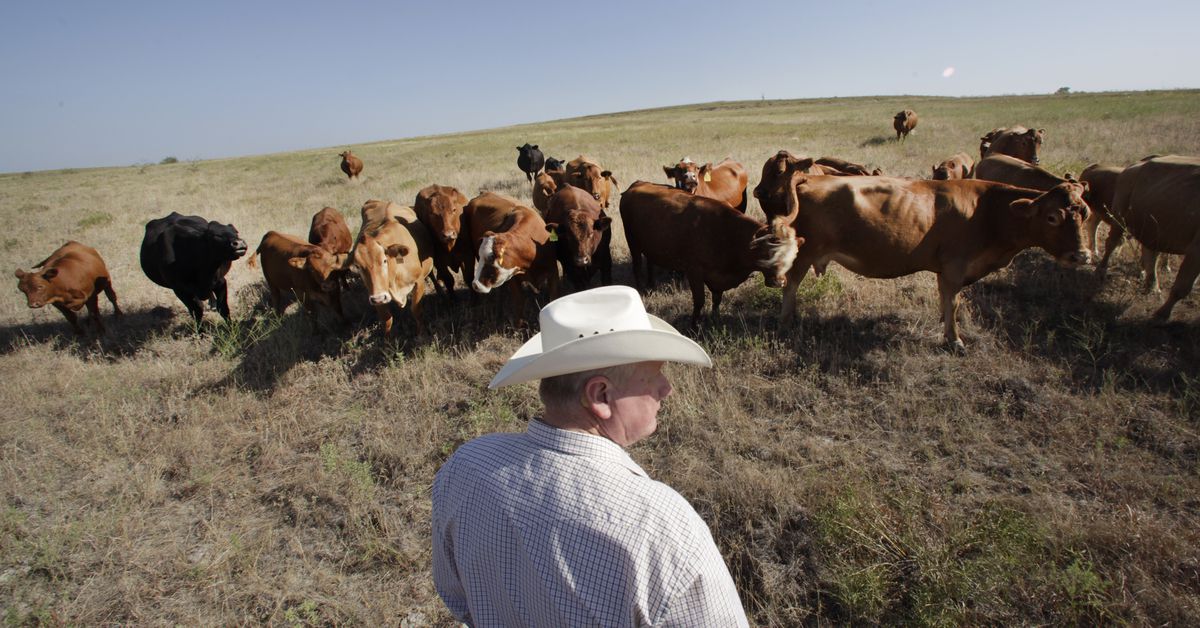- cross-posted to:
- [email protected]
- cross-posted to:
- [email protected]
Highlights: Last month, an environmental group sued the federal government for failing to protect turtles from cows.
To understand this bizarre-sounding but important lawsuit, you first have to understand the nature of cattle ranching in the American West.
Some 215 million acres of public land in the West — over 10 percent of the continental US — is loaned to ranchers at bargain-bin prices for their cattle to graze. As the cattle graze, they tend to disrupt ecosystems and do a lot of damage to the land. They eat or destroy plants consumed by native species, like turtles, which can lead to biodiversity loss. Their manure pollutes rivers and streams, and as they move about, they erode soil.
WWP alleges that for decades, the US Bureau of Land Management (BLM) and other agencies have violated an agreement they signed in 2001 that forbids cattle grazing in a part of Nevada’s Gold Butte National Monument in order to protect the desert tortoise, whose population has plunged since the 1980s.
One of the people accused of illegally grazing cattle on this protected land happens to be Cliven Bundy, the far-right cattle rancher who made a name for himself in 2014 after an armed confrontation with hundreds of his supporters against the BLM (the agency stood down and has allowed Bundy to continue illegally grazing his cattle).
BLM is generally mandated by federal law to assess the environmental health of grazing land before it renews ranchers’ permits, but Molvar said the agency often fails to do so, resulting in widespread environmental degradation.
BLM doesn’t face any real consequences because for years, Congress has passed a rider that requires BLM to renew cattle grazing permits upon their expiration, with or without the required environmental analysis.
The market rate for private grazing land in the Western US was around $22.60 per animal unit per month (AUM) in 2019, but in that same year, the BLM charged ranchers just $1.35 per AUM.
Even worse, the federal government spends millions annually on its “Wildlife Services” division, which kills wild animals it deems a threat to grazing livestock. Last year, it racked up a body count of 1.75 million animals, or 200 per hour.
The federal government’s livestock grazing program is just one part of America’s agricultural land use story. The other part is all the land used to grow crops to feed farmed cattle, chickens, pigs, and fish, which comes in at 127 million acres.
All told, a staggering 41 percent of land in the continental US is used for meat, dairy, and egg production. Globally, it’s more than one-third of habitable land. Much of it was once forest that’s since been cut down to graze livestock and grow the corn and soy that feeds them.
[see article for graphic: The demand for more meat is the leading cause of deforestation]
To avoid the worst effects of climate change, it won’t be enough to just reduce the amount of greenhouse gasses we spew into the air — we also need to remove them from the atmosphere. One effective way to do that, which doesn’t rely on unproven carbon capture technology, is by “rewilding,” or retiring agricultural land back to its original ecosystem so that its vegetation can sequester carbon dioxide. Much of that potential is currently wasted on inefficient livestock production — what climate scientists call the “carbon opportunity cost” of meat.
This is what actually pushed me into near-veganism.
In the past few months I’ve finally ended up committing to a vegetarian diet, mostly for this kind of reason. I had already replaced most of my meat intake with substitutes anyway, and articles like this eventually just kinda pile up at the edge of my memory to the point that it started to feel a bit guilty to buy the remaining things that I hadn’t yet found good substitutes for.
It’s only been recently (as in the last 2 years or so) that there have been really good advances in the taste of meat alternatives. Impossible burger tastes great and I and my kids love the impossible chicken too.
It’s honestly getting so easy to be vegetarian or even vegan. My kid has the uncompromising energy for it, I just do my best. I miss cooking meat more than actually eating it, strangely. I think every step has impact.
It’s for capitalists. The meat industry is part of that.
This article is about the physical land, of which the plurality is for the meat industry
TIL BLM stands for Bureau of Land Management. /s Also, land is capital.
Land is the oldest capital, literally the birth of Western civilization.
Who knew apportioning representation based on square footage would turn out this way?
This is the best summary I could come up with:
“The problems are huge, sprawling, and major,” said Erik Molvar, a wildlife biologist and executive director of the Western Watersheds Project (WWP), the group that sued numerous federal agencies for failing to preserve the habitat of the Mojave desert tortoise and 77 other species.
WWP alleges that for decades, the US Bureau of Land Management (BLM) and other agencies have violated an agreement they signed in 2001 that forbids cattle grazing in a part of Nevada’s Gold Butte National Monument in order to protect the desert tortoise, whose population has plunged since the 1980s.
The permitting program is costing the federal government tens of millions of dollars annually to administer, all while giving cattle ranchers a deep discount on public lands.
Even worse, the federal government spends millions annually on its “Wildlife Services” division, which kills wild animals it deems a threat to grazing livestock.
The programs that subsidize the beef industry represent some of the most striking examples of America’s tradition of “agricultural exceptionalism” — giving farmers and ranchers special treatment, like sweeping exemptions from critical environmental, labor, and animal welfare laws.
Agribusiness also benefits from getting large swathes of the West to itself, illustrating a simple fact of land use in America: Contrary to the famous Woody Guthrie song, much of it isn’t for you and me — it’s for the meat industry.
The original article contains 1,123 words, the summary contains 225 words. Saved 80%. I’m a bot and I’m open source!
It’s interesting to see the proponents of SAD and unfettered carnism and their reactions to anything that even slightly punctures their worldview. Most especially on the personal level, IRL, when they discover I don’t eat meat. The phrase “the personal is political” seems more relevant than ever when you see others getting major butthurt over others not eating meat.
They obviously feel threatened, given the reactions I get. And by this, I mean the ones that feel they need to tell me they “tried going without meat, but they need their protein” (lol, yeah, no), and/or they tell me how they like to hunt and they love grilling meat, etc…this is most especially from men that so obviously suffer from SDE and/or toxic masculinity…
Unfettered greed is ruining pretty much every industry. From half-released video games, to maximizing how much meat you can output in a year.






